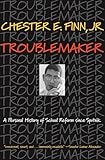Troublemaker : A Personal History of School Reform since Sputnik / Chester E. Finn.
Material type: TextPublisher: Princeton, NJ : Princeton University Press, [2008]Copyright date: ©2008Edition: Course BookDescription: 1 online resource (376 p.)Content type:
TextPublisher: Princeton, NJ : Princeton University Press, [2008]Copyright date: ©2008Edition: Course BookDescription: 1 online resource (376 p.)Content type: - 9780691129907
- 9781400828210
- online - DeGruyter
- Issued also in print.
| Item type | Current library | Call number | URL | Status | Notes | Barcode | |
|---|---|---|---|---|---|---|---|
 eBook
eBook
|
Biblioteca "Angelicum" Pont. Univ. S.Tommaso d'Aquino Nuvola online | online - DeGruyter (Browse shelf(Opens below)) | Online access | Not for loan (Accesso limitato) | Accesso per gli utenti autorizzati / Access for authorized users | (dgr)9781400828210 |
Frontmatter -- Contents -- Introduction -- Part I. Early Days -- Part II. The Seventies -- Part III. The Eighties -- Part IV. The Nineties -- Part V. Today and Tomorrow -- Epilogue. Two Little Girls -- Glossary -- Notes -- Index
restricted access online access with authorization star
http://purl.org/coar/access_right/c_16ec
Few people have been more involved in shaping postwar U.S. education reforms--or dissented from some of them more effectively--than Chester Finn. Assistant secretary of education under Ronald Reagan, and an aide to politicians as different as Richard Nixon and Daniel Moynihan, Finn has also been a high school teacher, an education professor, a prolific and best-selling writer, a think-tank analyst, a nonprofit foundation president, and both a Democrat and Republican. This remarkably varied career has given him an extraordinary insider's view of every significant school-reform movement of the past four decades, from racial integration to No Child Left Behind. In Troublemaker, Finn has written a vivid history of postwar education reform that is also the personal story of one of the foremost players--and mavericks--in American education. Finn tells how his experiences have shaped his changing views of the three major strands of postwar school reform: standards-driven, choice-driven, and profession-driven. Of the three, Finn now believes that a combination of choice and standards has the greatest potential, but he favors this approach more on pragmatic than ideological grounds, arguing that parents should be given more options at the same time that schools are allowed more flexibility and held to higher performance norms. He also explains why education reforms of all kinds are so difficult to implement, and he draws valuable lessons from their frequent failure. Clear-eyed yet optimistic, Finn ultimately gives grounds for hope that the best of today's bold initiatives--from charter schools to technology to makeovers of school-system governance--are finally beginning to make a difference.
Issued also in print.
Mode of access: Internet via World Wide Web.
In English.
Description based on online resource; title from PDF title page (publisher's Web site, viewed 29. Jul 2021)


